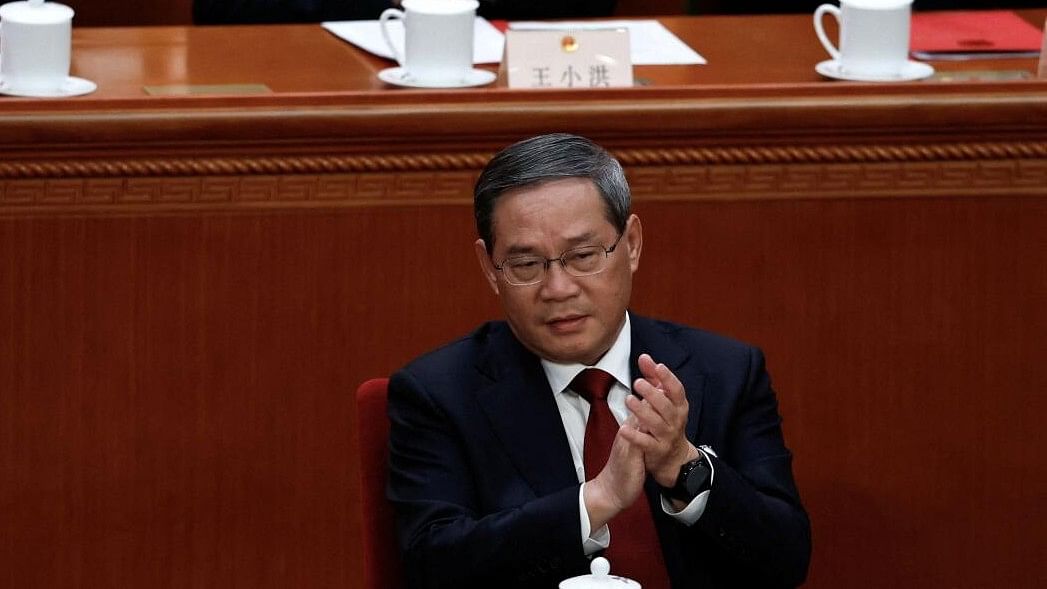
Li Qiang
Credit: Reuters Photo
In his government work report delivered on March 5 at the opening session of the National People’s Congress, Chinese Premier Li Qiang drew a link between global problems and the Chinese economy. He noted a global economic recovery post the pandemic that is “sluggish” and “geopolitical conflicts [becoming] more acute, protectionism and unilateralism… on the rise, and the external environment exert[ing] a more adverse impact on China’s development.”
Broadly then, there is an effort by the ruling Communist Party of China (CPC) to shirk responsibility for the country’s current economic difficulties, and to blame external players or circumstances.
In the past, China’s domestic economic problems could be held at bay because its export growth and integration with the world economy continued apace. However, as major world economies have faced both economic crises and populism, the CPC’s mercantilism in economic policy and zero-sum approach to global politics have led to increased opposition to China’s way of doing business. From the United States to the European Union to India, governments have targeted Chinese entities with varying degrees of restrictions on engagement and trade, seeking greater fairness, and openness in China’s domestic market.
‘Distinctive Chinese features’
Li’s declaration that China would “foster a world-class business environment that is market-oriented, law-based, and internationalized” should be juxtaposed with the simultaneous desire “to build a high-standard socialist market economy” and “a modern corporate system with distinctive Chinese features”.
He also promised to “provide stronger guidance and support on quality and standards to create more Chinese brands with global reach”. But “distinctive Chinese features” or “Chinese characteristics” can only refer to the authoritarianism of the Chinese political system as well as the opacity and data fudging in its economic system. It also suggests that not only will Chinese corporates remain subservient to the CPC, but that they will also continue to range the globe to acquire natural resources and cutting-edge technology or companies that produce such technologies by fair means or foul. This can only be a recipe for further trouble and tensions in China’s ties with other countries.
To find amenable replacements
Even though Li says that China “will get fully involved in the reform of the World Trade Organization and promote the building of an open global economy”, in practice, China prefers bilateral arrangements such as FTAs and multilateral arrangements that it can lead or oversee. Thus, the Belt and Road Initiative (BRI), the Global Development Initiative, associated institutions like the Asian Infrastructure Investment Bank and the BRICS New Development Bank, and initiatives like the Chinese digital yuan or China’s Cross-Border Interbank Payment System should be seen as part of the Chinese ambition to find amenable replacements for the Bretton Woods system, the US dollar, and the SWIFT banking service.
All these interests are evident in the stress on “the healthy development of cross-border e-commerce” and applying “the negative list for cross-border trade in services”. The intent is to continue improving China’s economic connectivity with and deepening of its presence in the economies of neighbouring countries and to reduce space for competitors.
A buffer for China
The desire to “build up our security capacity in key areas” involves establishing a national reserve system for grain, ensuring “China’s food supply remains firmly in our own hands”, enhancing Internet and data security, and safeguarding the security and stability of industrial and supply chains. Given the nature of the Chinese Party-State, each of these should be read as measures to buffer China against the international environment, and if necessary even at a cost to other countries. More generally, it suggests that China has low confidence in either globalisation or interdependence — despite frequent rhetoric to the contrary — and should give pause to those enamoured by the Chinese Premier’s professed support for foreign trade and investments.
China is now a pioneer and market leader in many green and low-carbon industries, including electric vehicles and energy storage devices. Given its role also as a leading source of critical minerals, there are leverages China can exploit. One, for instance, is in global climate governance, which as Li points out, China has “actively participated in and promoted”. The reference here to encouraging “the use and international mutual recognition of green electricity” should be understood as a Chinese interest in setting global standards to encourage the use of Chinese infrastructure, services and standards over rival options.
Conclusion
At a meeting of the National People’s Congress last year, China’s President Xi Jinping said that “security is the bedrock of development”, drawing increased attention to the intimate links between economic and security interests in the Chinese ecosystem. This year, such hard-line rhetoric is relatively absent, but it is important to underline that the links remain strong and important for the ruling CPC. When read closely, Li’s work report adds to the expanding evidence from China that its economic policies even when they talk about global outreach and reform of global institutions, are less about these things than securing the CPC’s regime interests, achieving Chinese leadership in international bodies, and undermining rivals.
(This is the second in a two-part series on the ‘Report on the work of the government’ presented at the 14th National People’s Congress in Beijing, China, on March 5.)
(Jabin T Jacob is Associate Professor, Department of International Relations and Governance Studies, and Director, Centre for Himalayan Studies, Shiv Nadar Institution of Eminence, Delhi-NCR. X: @jabinjacobt)
Disclaimer: The views expressed above are the author's own. They do not necessarily reflect the views of DH.